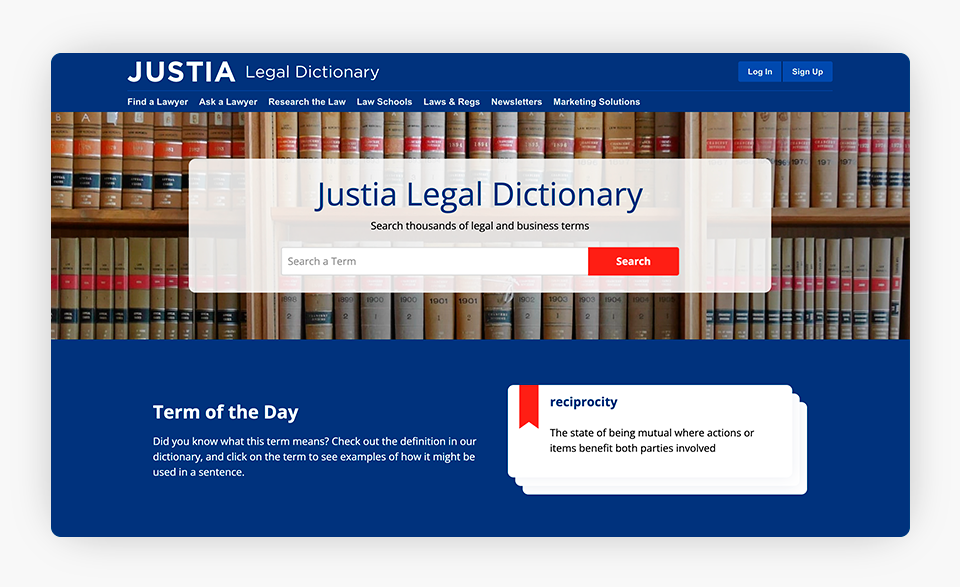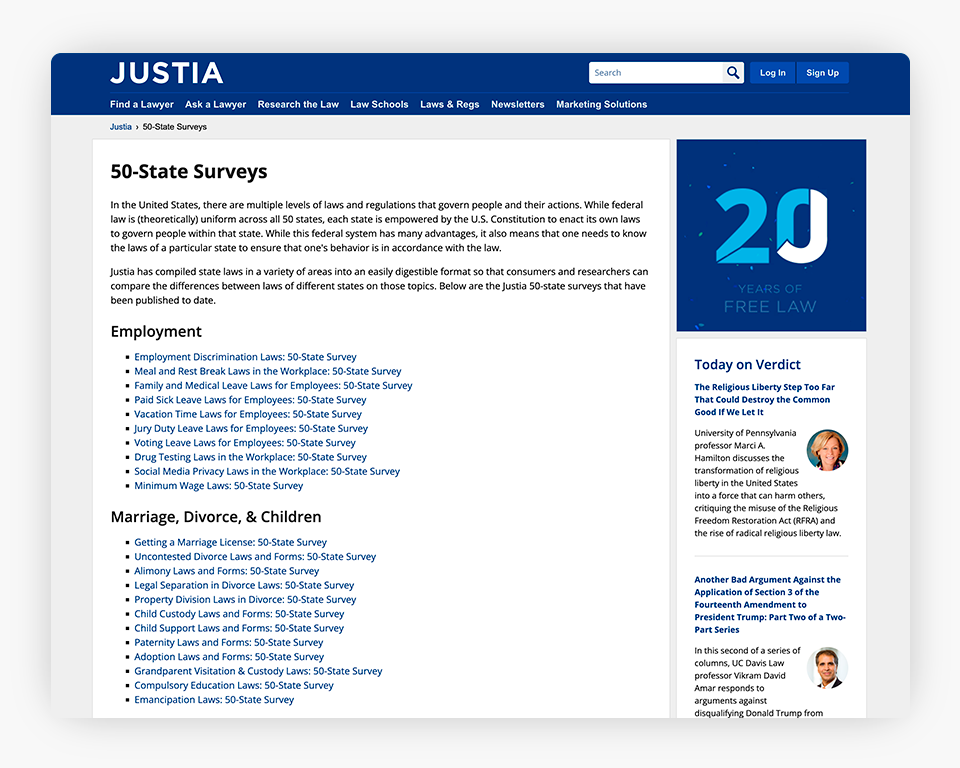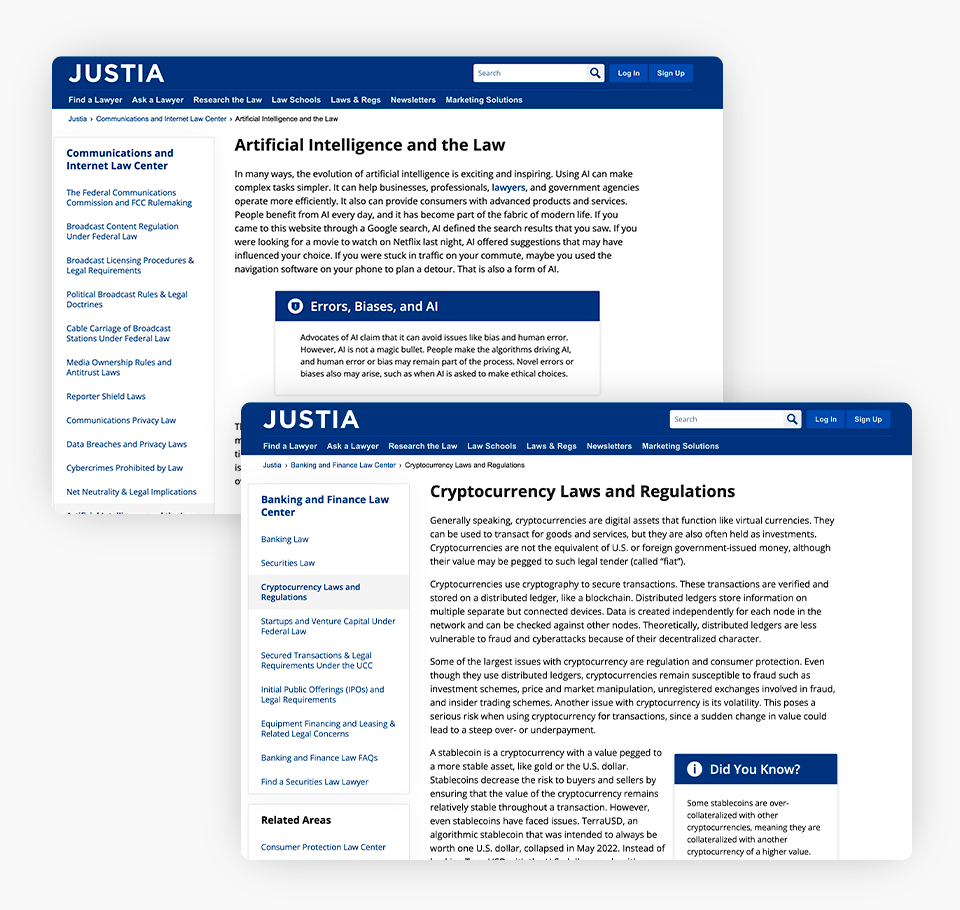We can’t send you updates from Justia Onward without your email.
Unsubscribe at any time.
Read about some of the highlights from what we accomplished this year in expanding our portal of free legal resources. We compiled a legal dictionary, 50-state surveys, and biographies of U.S. Supreme Court Justices, among other projects.
Each year, the team at Justia builds on the broad range of resources that we offer to consumers, attorneys, and academics in the legal field. Our projects in 2023 included a brand-new dictionary with thousands of legal and business terms, as well as numerous 50-state surveys on topics extending from family law, personal injury, and criminal law to employment law and consumer protection. We also expanded our recently redesigned U.S. Supreme Court Center by adding biographies of each Justice. Some of our other editorial efforts included projects designed specifically to address issues of current relevance.
Justia Legal Dictionary

Judges and lawyers use a distinctive vocabulary, much of which is unfamiliar to the average American. Understanding these terms can empower someone facing a dispute or engaging in a transaction. It also can help people keep up with current events that involve legal issues.
The Justia Legal Dictionary allows visitors to easily search for terms that they want to understand. When they reach a term page, they will find one or more concise definitions of the term, written in ordinary English. They also will find three examples of how the term might be used in a sentence, which can help bring it to life. In addition to using the search feature, visitors can access terms from an alphabetical index.
Our team plans to add more terms to the Dictionary over time. Like other resources that Justia provides, it is completely free for anyone to access.
50-State Surveys

Some areas of law, such as immigration and patents, consist largely of statutes, regulations, and court decisions at the federal level. However, many other areas vary significantly by state. To account for these variations, the team at Justia added numerous entries to our 50-state surveys during the course of 2023. For example, we compiled surveys in the following areas:
- Family and children: marriage licenses, grandparent visitation and custody, compulsory education, and emancipation of minors
- Employment: minimum wage laws
- Personal injury: dog bite laws and dram shop laws (related to drunk driving accidents)
- Criminal law: drug possession laws and criminal statutes of limitations
- Money and property: consumer protection laws, fair debt collection laws, and income tax laws
- Legal procedures: civil statutes of limitations
- Current issues: death penalty laws
Each entry in a survey offers a concise summary of the law in that state, while often providing links to related free resources available through Justia, such as statutes and case law. These can help consumers delve deeper into the nuances of the topic.
Supreme Court History Resources

Nobody has played a more vital role in shaping American law than the 116 Justices who have served on the U.S. Supreme Court since its creation in 1789. Understanding their positions on key issues often requires understanding the paths that led them to the Court. Moreover, some Justices have shifted over time from one side of an issue to the other. This sometimes alters the position of the Court as a whole.
To provide context for people reading Supreme Court opinions on our site, the team at Justia added brief biographies of the Justices. These describe the early life and career trajectory of each Justice, while summarizing their contributions to the Court and any legacy that they left behind.
New Content on Current Issues

Notable events during the course of 2023 led us to add content on topics of developing interest. For example, many Americans followed the prosecution of “cryptocurrency king” Sam Bankman-Fried, who was eventually convicted by a New York jury of several white collar crimes. This brought the cryptocurrency field into the public eye. We expanded our Banking and Finance Law Center with a discussion of cryptocurrency laws and regulations, addressing topics such as the treatment of these digital assets under securities and tax laws.
This year also saw the emergence of generative artificial intelligence on platforms such as OpenAI. Consumers and businesses alike explored the potential of this new technology. The law on generative AI remains unsettled, with several lawsuits pending. In the meantime, we added a broader overview of artificial intelligence and the law to our Communications and Internet Law Center. This covers applications of AI to areas such as personal injury lawsuits, consumer rights, the criminal justice system, and employment discrimination claims.
Final Thoughts
Understanding the law, its language, and its history can empower ordinary people and help them advance their interests. While there is no substitute for consulting an attorney on a particular legal issue, the Justia portal provides a useful overview of the rights and obligations of Americans in many key areas. As the year draws to a close, our team is already planning projects for 2024. We look forward to finding new ways to further our mission of making law free for all.
Related Posts